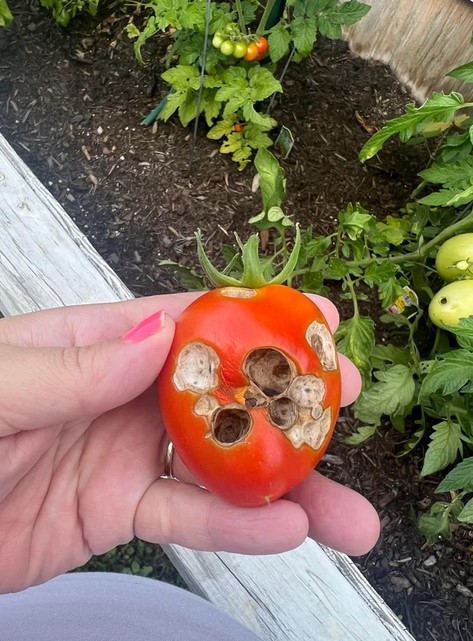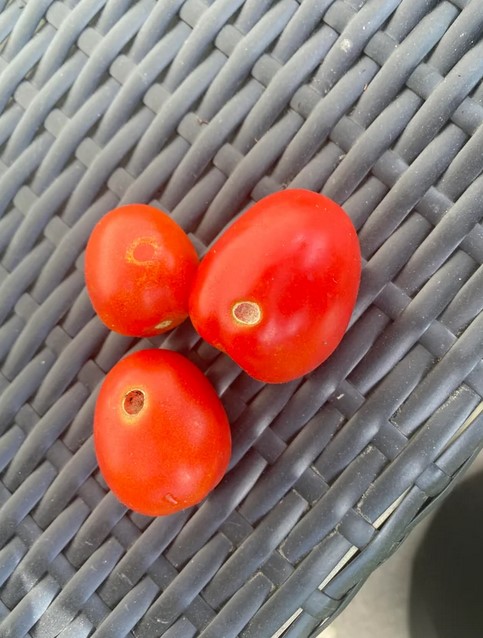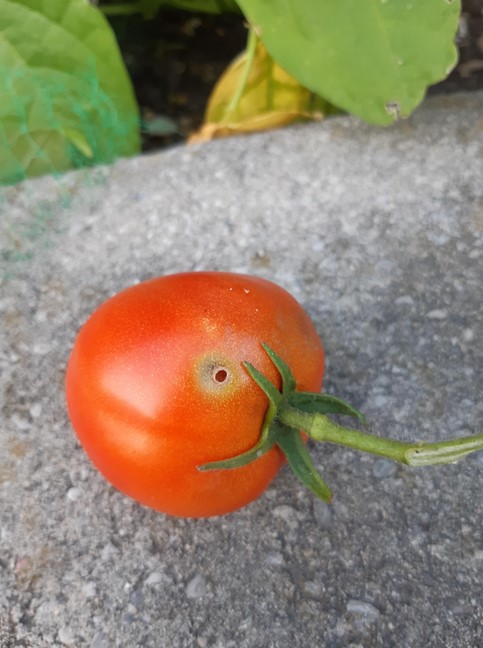If you have encountered mysterious holes on the tomato’s surface, it can be both frustrating and puzzling. So, in this guide, we will explore the various causes behind those holes in your tomatoes, which will also help you protect future harvests.
Let us now investigate the possible causes, uncover the secrets behind this mystery, and look forward to flawless and flavorful tomatoes.
Get ready to discover the hidden culprits and know how to keep your tomatoes hole-free and delicious.
What Are The Probable Causes Of Holes In Your Tomatoes?
Table of Contents

The common causes of holes in tomatoes are discussed below vividly and will help you to derive a clear idea about the same. So, here are the causes:
1. Pest Infection
Tomato fruitworms, tomato hornworms, stink bugs, slugs, and snails are some pests known to infect tomatoes and are mainly responsible for their tiny holes.
They make small circular holes in the fruits and slowly try to penetrate their fruit by leaving small, pinprick holes. These pests try to eat the fruits, creating holes that damage the fruit. These rugged holes are generally irregular in shape and are particularly found at the base of the fruit.
Therefore, we can say that pest infection is one of the most common reasons for those tiny and irregular-sized holes in your beloved tomato fruits.
2. Birds And Small Animals
Also, certain birds and small animals, like squirrels, peck at the tomatoes, especially when the fruit is ripe and juicy, creating small to medium-sized circular holes.
Animals like mice and rats try to nibble on the tomatoes, creating larger and irregular holes in the ground.
So, both birds and smaller animals have a tendency to nibble on these juicy delights of your garden that in turn results in holes and at times makes those juicy delights not suitable for consumption purposes.
3. Environmental Factors
Several environmental factors lead to holes in tomatoes, such as inconsistent watering techniques. Also, excessive exposure to sunlight, especially in tremendously hot climates, results in holes as the tissue deteriorates.
Temperature fluctuations and changes in moisture level also contribute to cracks and holes in healthy tomato fruits. So, regular inspection and timely intervention will help to preserve the quality of the crop.
Furthermore, mechanical damage from sharp objects or by wind or rubbing against branches also develops small holes in tomatoes.
4. Disease

Specific bacterial or fungal infection leads to holes or even break down the fruit’s skin. Fungal diseases cause small, circular, sunken lesions on tomatoes, which expand and deepen with time.
Anthracnose is a fungal disease that can be spotted in tomatoes which initially looks like a sunken spot but later develops into holes and eventually the fruits start showing signs of decay.
5. Nutritional Deficiencies
Calcium deficiencies lead to dark, sunken spots in tomatoes that gradually deepen with time. This damaged area, in turn, becomes an entry point for pests and further decays or develops into bigger holes.
Also, excessive nitrogen is harmful to tomatoes therefore a balanced nutrient profile is extremely essential for robust plant health.
Therefore, nutritional deficiencies or nutrient imbalances create holes in tomatoes and make the fruit more vulnerable to other factors that are directly responsible for causing holes.
Natural Remedies To Treat Holes In Tomatoes

Various factors cause holes in tomatoes and can be treated by using some natural remedies, and a few of those are:
1. Baking Soda Solution
If a mixture of baking soda, water, and liquid soap is sprayed on tomato plants, it will prevent fungal diseases that can further weaken the tomatoes and eventually make them more susceptible to pests.
2. Neem Oil
Mixing neem oil with water and a few drops of dish soap and then spraying it on plants will act as a natural insecticide and fungicide, eventually deterring a wide range of pests and helping control fungal infections.
Spraying neem oil and water on your tomato plants every week, especially after rain, will help deter insects that cause holes.
So, applying neem oil is a natural remedy for dealing with the holes in your tomatoes.
3. Diatomaceous Earth
This natural powder made from fossilized algae will work wonders if sprinkled around the base of the tomato plant and on top of the foliage. This will help prevent insects from crawling on the plants, which in turn will cause them to dehydrate and die, thereby preventing your tomatoes from getting holes.
Spread this natural powder around your tomato plants, creating a barrier for insects like caterpillars and beetles.
4. Row Covers
Row covers protect the tomato plants from insects, thereby acting as a physical barrier and preventing pests from reaching the plants and making holes in the fruits.
5. Hand-Picking Pests
It is equally important to remove pests by hand picking them from plants and also by regularly monitoring them so that they can be removed as soon as possible.
Remember hand-picking pests is one of the easiest convenient methods of preventing holes in tomatoes.
6. Companion Planting
Companion planting is another wonderful technique to keep your tomatoes fresh and free of holes.
In this case, planting specific herbs and flowers near the tomato plants will play a key role in repelling the pests. This, in turn, will keep the fruits fresh and free from holes or any damage.
7. Pruning
Pruning is an essential practice that will help in keeping your tomato plants hole-free and free from damage. Regular and effective pruning reduces the risk of fungal infection and will help prevent holes in the tomatoes.
Pruning helps to cultivate robust tomato plants that yield high-quality, hole-free tomatoes and also maximizes tomato harvest.
8. Consistent Watering
Proper and adequate watering practices will keep the plants healthy, make them less vulnerable to pests, and, in turn, help keep the tomato plants free from holes.
9. Garlic And Chilly Pepper Spray
Using a homemade insect repellent made from water, garlic, and chilly peppers will help protect your tomato plant from harmful pests, which will, in turn, not damage your harvest.
10. Attracting Beneficial Insects
Some natural predators such as ladybugs, lacewings, and parasitic wasps will help to control the pest population naturally and will therefore reduce the incidence of holes in your tomatoes.
These beneficial insects help to control the pests that bore into tomatoes and therefore prevent holes from forming. Also, by following this you can create a harmonious ecosystem in your garden control pests, and reduce the incidence of holes in your tomatoes.
Closure
So, embrace the challenge, grow healthy tomatoes by monitoring the fruits closely, and finally transform your garden into a pest-resistant oasis.
Tell us how you took care of your tomatoes in the comment section below.
Leave a Reply